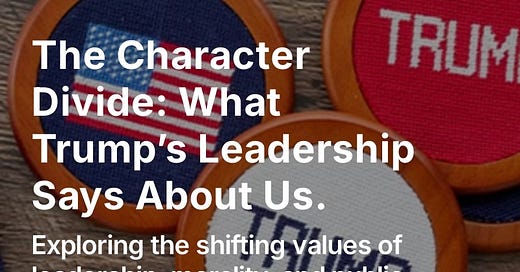The Character Divide: What Trump’s Leadership Says About Us.
Exploring the shifting values of leadership, morality, and public trust in America’s polarized political landscape. 4 minute read
My siblings and extended family voted for Trump. This is my response to their varied, yet often similar, reasons for doing so.
Leadership isn’t just about power or ambition—it’s about character. For many, character represents integrity, moral principles, and the ability to stay consistent under pressure. When we look at Donald Trump’s record, though, it raises serious concerns. Allegations of sexual misconduct, including a civil judgment in the E. Jean Carroll case, alongside business fraud convictions and infidelity scandals, suggest a pattern of behavior that undermines trust and ethical leadership.
In a democracy, trust is essential. Leaders are expected to embody accountability and respect, modeling values that unify society. Trump’s first presidency, however, often fell short of these ideals. With over 30,000 documented falsehoods, inflammatory rhetoric, and divisive policies like family separations at the border, his approach prioritized spectacle over substance. These choices eroded the moral authority and accountability that leadership demands.
But not everyone sees it that way, (like my Pro-MAGA family). Trump’s supporters view his defiance of norms as a strength rather than a flaw. To them, personal scandals are irrelevant, and legal troubles are reframed as evidence of resilience in the face of political persecution. From this perspective, character isn’t about traditional virtues like empathy or accountability—it’s about toughness, loyalty, and the ability to “win.”
This shift in values doesn’t exist in a vacuum. Modern culture, driven by social media and polarized narratives, often rewards leaders who dominate the conversation rather than those who embody ethical principles. Figures like Trump thrive in an environment that prizes spectacle, where performance often overshadows the need for long-term vision and responsibility.
The consequences of this cultural shift are significant. When leadership becomes a performance, focused on short-term wins and divisive tactics, society risks losing the values that foster progress and unity. True leadership isn’t about reinforcing divisions or refusing to admit fault. It’s about acknowledging flaws, learning from mistakes, and striving to serve others.
So, what should we demand from our leaders? The answer lies in reclaiming the core of what character means. Leaders should inspire trust through their actions, build bridges rather than walls, and commit to values like integrity and justice over fleeting victories. The future of leadership—and democracy itself—depends on the values we prioritize.
Character still matters. It’s not just an ideal; it’s a foundation for progress, unity, and the principles that hold a society together. Let’s not settle for anything less.





